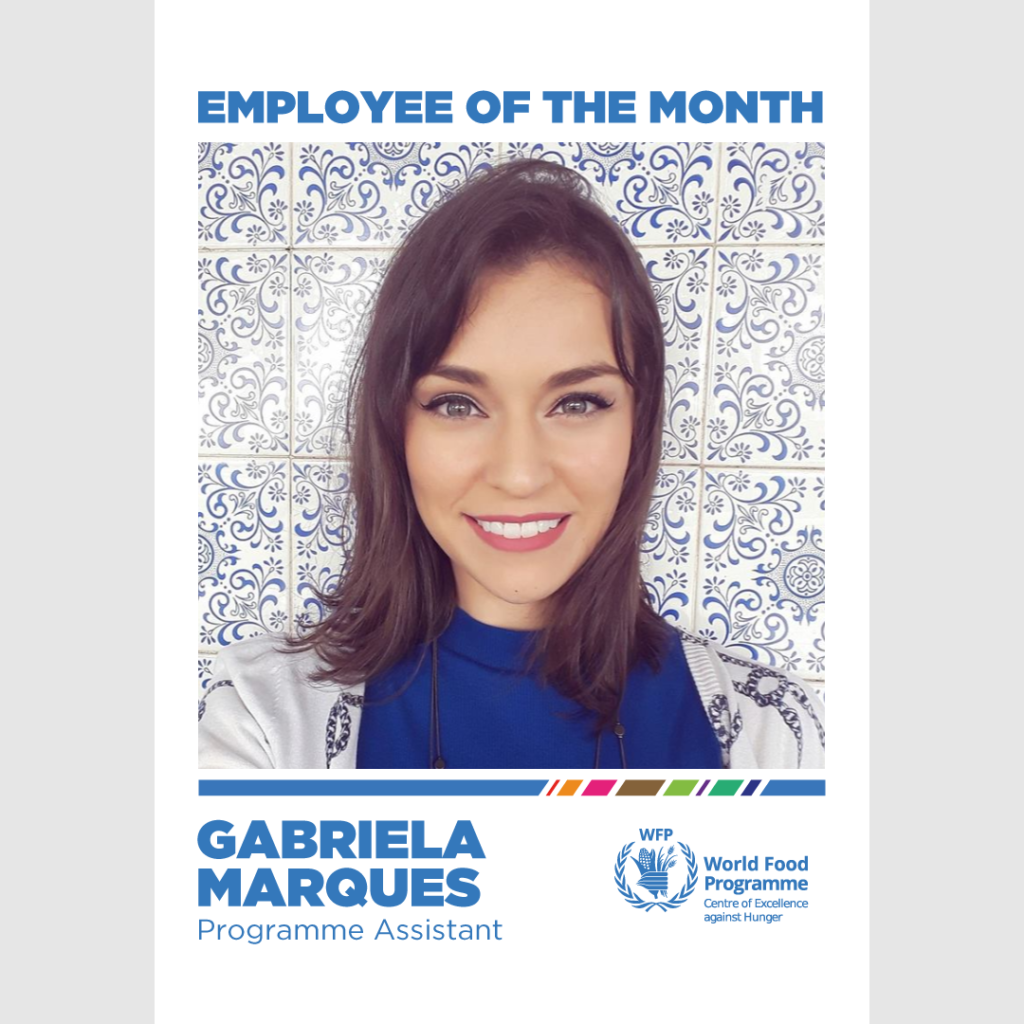
“I was sitting on a couch at the front desk, eagerly waiting for my interview for an internship at the WFP Centre of Excellence. A beautiful, high-heeled employee passed by, looking very busy. She greeted me, offered me water and coffee. Another female employee passed with the same characteristics and the same kindness. Then came was the third and fourth, and I thought, ‘Wow, what an incredible place, what incredible women, this is where I want to work!’ ”
Thus began the trajectory of Gabriela Marques in the WFP Centre of Excellence against Hunger. The year was 2015, and she was still an International Relations student, applying for an internship in the area of human resources. Because of her education background, her previous experience in the Brazilian Ministry of Foreign Affairs and her language skills, Gabriela was selected for the internship.
According to Gabriela, studying International Relations was a natural choice. “There was no other course with which I identified myself, so International Relations always seemed to me the only way, my way.” But university life was less than the organized and diplomatic student expected. “I knew that acting only in the academic field would not satisfy me, so as I progressed in the course, I realized that only theoretical solutions that came from outsiders and did not take into account the complexities of internal contexts did not work as well as those built through cooperation. I saw that the UN had interesting solutions in this area and I started to be interested in the institution.”
Gabriela followed the social media profiles of several UN agencies and ended up learning about the internship vacancy at the WFP Centre of Excellence. During the one-year internship, she prepared her end-of-course paper on humanitarian assistance and South-South cooperation, focusing on the Centre’s innovative approach. During the finalization of the writing process of her paper and a few months before graduating, Gabriela was hired as assistant of the WFP Centre’s Programme Unit.
The transition from intern to employee was not simple. Because she started working at the WFP Centre at only 20 years of age and as a trainee and because she has a sweet personality, people tend to see Gabriela as very young, and breaking that stereotype was difficult. “I knew the dynamics and responsibility as an employee in the programme area would be different and I prepared for it. I spent months reading every document that supports the work of the Centre, always with excellent guidance from my supervisors,” she says.
“Mastering other languages is a basic tool of our work, it is fundamental, but I believe that the ability to innovate, to adapt to different situations, and to be able to deal with all kinds of people, within different contexts, cultures, and interests, is my greatest everyday ally,” she says. “The WFP Centre is very focused on innovation; we cannot settle and become bureaucratic. This is a great challenge, but it is also the most interesting aspect of my work, because everything is very dynamic and every day we need to do something different.”
For Gabriela, the most interesting experience at the WFP Centre was attending the 2018 Global Child Nutrition Forum in Tunisia. “I had already worked on the organization of previous editions of the Forum, but being in the event and seeing everything happening was a great learning process that made me feel very useful,” she says.
“I see as my life purpose to always try to make a difference in people’s lives, especially in vulnerable situations, and I believe that the United Nations takes concrete action to improve lives. Although it is not perfect, the UN is today our best tool to build a better world, and that is why we cannot settle where we are, we must always innovate,” says Gabriela. “I see the direct impact of my work on school feeding in Brazil and many other countries and this is very satisfying.”




